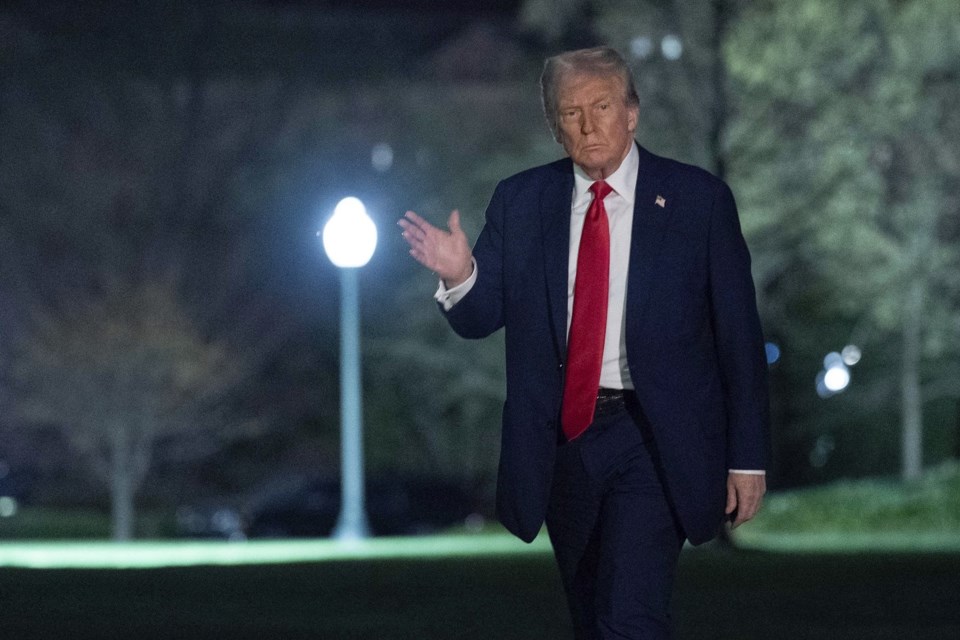WASHINGTON — As U.S. President Donald Trump prepares to unveil his "liberation day" plan to hit multiple countries with tariffs, it's still not clear whether a temporary pause on separate economywide duties on Canada will be lifted.
The world will be watching when the president discusses his reciprocal tariff agenda at the White House around 4 p.m. EDT. Trump has said he will impose reciprocal tariffs by increasing U.S. duties to match the tax rates other countries charge on imports.
"By reversing more than 75 years of U.S. trade policy, we are now even further in uncharted territory," Tim Brightbill, co-chair of Wiley Rein International Trade Practice in Washington, said in a media statement.
Prime Minister Mark Carney paused his federal election campaign Wednesday to take part in meetings in Ottawa. He is expected to meet virtually Wednesday afternoon with his Canada-U.S. relations council and convene a cabinet committee after Trump's speech.
Carney spoke Tuesday with Mexican President Claudia Sheinbaum. His office said it was "a productive call" that touched on Carney's plan to increase trade between the two countries to fight Washington's "unjustified trade actions against Canada" and blunt the impact of tariffs.
At her Wednesday morning press conference, Sheinbaum said that the two spoke about strengthening the Canada-U.S.-Mexico-Agreement on trade, negotiated during the first Trump administration.
"We agreed that it's very important to keep communicating with the United States, because of the importance of the integration of our three economies," she said in Spanish.
While it's not clear what the latest levies could mean for Canada, the country could also face a second hit with the return of fentanyl-related duties at the same time.
In early March, Trump imposed — and then partially paused — 25 per cent across-the-board tariffs on Canada and Mexico, with a lower 10 per cent levy on energy, and linked the duties to the flow of fentanyl across the border.
U.S. government data shows that only a very small volume of the drug is seized at the northern border. The Annual Threat Assessment report, released last week, does not mention Canada in its section on illicit drugs and fentanyl.
The president had said those tariffs would return Wednesday — but the White House indicated earlier this week that no decision had been made.
Trump said last week that Canada and Mexico had "stepped it up" — but an incoming U.S. Senate resolution to end the emergency at the northern border has put Canada back in the president's crosshairs on social media.
"Mitch McConnell of Kentucky, Susan Collins of Maine, Lisa Murkowski of Alaska, and Rand Paul, also of Kentucky, will hopefully get on the Republican bandwagon, for a change, and fight the Democrats wild and flagrant push to not penalize Canada for the sale, into our Country, of large amounts of Fentanyl, by Tariffing the value of this horrible and deadly drug in order to make it more costly to distribute and buy," Trump posted just before 1 a.m. EDT Wednesday.
It's not clear what the president meant when he said he would impose tariffs on fentanyl coming from Canada.
Democrat senators plan to force a vote Wednesday afternoon on Trump's use of the International Economic Emergency Powers Act, also called IEEPA, to declare an emergency over fentanyl trafficking in order to hit Canada with tariffs. Sen. Tim Kaine on Tuesday called it a "made-up emergency."
The vote could put Republican lawmakers from states that rely heavily on trade with Canada in the rare position of opposing Trump's tariff agenda. Republican Sen. John Barrasso told Wednesday's Senate hearing that Trump's tariffs are necessary to secure the border with Canada and that the president is "not going to let up."
But Collins, a Republican senator from Maine, said that Canadian "neighbours" are working with American law enforcement and the problem of fentanyl at the northern border is small. She said the Maine economy is intertwined with Canada's and the tariffs would be devasting for businesses and families in her state.
Even if the Democrats' resolution gets enough Republican support to pass the Senate, it probably won't stop Trump's emergency declaration because it's not likely to come up in the House. Trump said on social media that "it is not going anywhere because the House will never approve it and I, as your President, will never sign it."
— With files from Dylan Robertson in Ottawa.
This report by The Canadian Press was first published April 2, 2025.
Kelly Geraldine Malone, The Canadian Press




